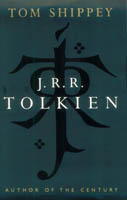J.R.R. Tolkien: Author of the Century

Shippey, Tom. J.R.R. Tolkien: Author of the Century. New York: Houghton Mifflin, 2001 ISBN 061812764X, hc, 384 pp., $26.00.

(This review originally appeared in Mythprint 38:2 (#227) in February 2001.)
Reviewed by David Bratman
The author’s name is given as Tom Shippey on the jacket and T.A. Shippey on the title page. But under either name, he is of all writers on Tolkien the one most worth reading.
Like Tolkien, Prof. Shippey has taught Old English at both Oxford and Leeds Universities. Drawing on this common background, he has demonstrated a profound and lucid grasp of Tolkien’s philological background, literary creativity, and moral purpose. In short, Shippey can tell you, better than anyone else, just what this peculiar (in both senses) writer was on about. He first demonstrated this ability in a book titled The Road to Middle-earth in 1982. If there has been one essential literary study of Tolkien, it has been that book, which is still in print though difficult to find.
Now Road has been semi-rewritten and semi-expanded in the form of this new book. By its deliberately provocative title, Shippey means two things — that Tolkien was one of the great authors of the 20th century, despite critical attempts to dismiss his importance; and that Tolkien was an author of the century, a characteristically 20th-century writer, despite perceptions of him as a medieval atavism. Shippey discusses the curious critical neglect of Tolkien, and finds striking similarities between Tolkien and modern authors as different as George Orwell and William Golding. These parts of this book were not in Road, but derive from articles Shippey has written since then.
The bulk of the book is Shippey’s demonstration of Tolkien’s claim to greatness in terms of literary quality, and this is the part deriving from Road. Rarely copying the earlier book’s exact wording, Shippey makes most of the same points and some additional ones. The brilliance of his thoughts can be best seen in one section discussing the nature of the Ring’s evil and the effects it has on those who come into contact with it. Shippey demonstrates that the Ring balances between being a sentient creature of active evil and a “psychic amplifier” that merely preys upon the bearer’s latent susceptibility. He suggests that the Ring works on the mind in the manner of drug addiction, which explains both why Frodo and Sam survive bearing it without harm (addiction in early stages is curable), and why Boromir succumbs to the disease without ever touching the Ring (addiction must be preceded by desire). I hope I have not summarized Shippey’s point too badly, because no-one has ever had a more perceptive insight into Tolkien’s literary and moral purpose.
Besides The Hobbit, The Lord of the Rings, and The Silmarillion, Shippey also discusses the shorter fictions Tolkien published in his lifetime, some of his poetry, and the “Lost Road/Notion Club” complex. The other drafts in “The History of Middle-earth” are mentioned only as needed to make points about the published books. Shippey also touches upon Tolkien’s professional scholarship, showing its intimate relation to, and helpfulness in understanding, his fiction. Some of this is also new.
Besides being a brilliant critic, Shippey is an entertaining one. Anyone who has heard him speak knows that he is a captivating lecturer (in that way he differs from Tolkien’s professorial reputation), and the same energy, enthusiasm, and wit carry over into his writing. A few parts of this book struck me as a little slack or hasty, but that may have been because they discussed points I already knew from Road. I suspect a reader new to Shippey will not find them so. For the most part, even the reworked parts make invigorating reading. Shippey is aware of his tendency to digress, so he provides in the Foreword an outline of what is to follow. But even his digressions are for a point, and worth following him on.
Because of its basis in Road and in other published articles of Shippey’s, the reader who has all of these does not, strictly speaking, need this book. But anyone — like me — who is that fond of Shippey’s writing will surely want this book. Anyone interested in Tolkien who has not read Shippey before should take this opportunity to do so immediately.